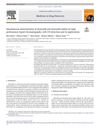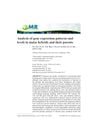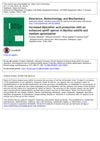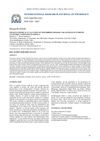 13 citations,
November 2010 in “Experimental Dermatology”
13 citations,
November 2010 in “Experimental Dermatology” Vitamin C derivative reduces hair loss-related protein in cells.
 4 citations,
May 2020 in “Medicine in Drug Discovery”
4 citations,
May 2020 in “Medicine in Drug Discovery” The study developed a method to detect minoxidil and its sulfate form, found that minoxidil sulfate is temperature-sensitive, and identified a way to potentially increase its stability for hair loss treatment.
 4 citations,
October 2016
4 citations,
October 2016 Herbs like aloe vera and amla are effective and safe for treating hair loss.
 1 citations,
March 2021 in “Skin health and disease”
1 citations,
March 2021 in “Skin health and disease” Better hair loss models needed for research.
 21 citations,
April 2012 in “European Journal of Pharmaceutics and Biopharmaceutics”
21 citations,
April 2012 in “European Journal of Pharmaceutics and Biopharmaceutics” The gel with special fat-loaded particles from rice bran could be an effective skin treatment for hair loss.
 14 citations,
July 2016 in “Environmental Toxicology and Pharmacology”
14 citations,
July 2016 in “Environmental Toxicology and Pharmacology” Cedrol may prevent hair loss caused by chemotherapy better than minoxidil.
 26 citations,
December 2013 in “Aesthetic Plastic Surgery”
26 citations,
December 2013 in “Aesthetic Plastic Surgery” Micropigmentation safely and effectively hides scalp hair loss and scars.
 22 citations,
August 2011 in “Journal of Supercritical Fluids”
22 citations,
August 2011 in “Journal of Supercritical Fluids” Rice bran extract might help prevent hair loss.
 5 citations,
January 2015 in “Genetics and Molecular Research”
5 citations,
January 2015 in “Genetics and Molecular Research” Maize hybrids show better early growth due to complex gene interactions from their parent strains.
 January 2023 in “Biocell”
January 2023 in “Biocell” Safflower extract helps protect hair follicle cells from damage caused by chemotherapy.
 September 2017 in “The journal of investigative dermatology/Journal of investigative dermatology”
September 2017 in “The journal of investigative dermatology/Journal of investigative dermatology” Blocking CCR5 can prevent and improve hair loss in alopecia areata.
 12 citations,
November 2014 in “Bioscience, Biotechnology, and Biochemistry”
12 citations,
November 2014 in “Bioscience, Biotechnology, and Biochemistry” Genetically modifying a bacteria and changing its growth conditions significantly increased the production of a chemical called dipicolinic acid.
 7 citations,
January 2018 in “Medicinski arhiv”
7 citations,
January 2018 in “Medicinski arhiv” A herbal extract may help treat certain types of hair loss by reducing a specific gene's activity.
 38 citations,
June 2018 in “Archives of Toxicology”
38 citations,
June 2018 in “Archives of Toxicology” Different species and human skin models vary in their skin enzyme activities, with pig skin and some models closely matching human skin, useful for safety assessments and understanding the skin's protective roles.
 2 citations,
August 2020 in “International Journal of Cosmetic Science”
2 citations,
August 2020 in “International Journal of Cosmetic Science” Lindera strychnifolia root extract may help balance scalp bacteria and potentially reduce hair loss.
 3 citations,
March 2014 in “Journal of Industrial Microbiology & Biotechnology”
3 citations,
March 2014 in “Journal of Industrial Microbiology & Biotechnology” Scientists found a new gene in a bacterium that can modify an immunosuppressant drug, potentially helping to treat hair loss.
 October 2020 in “Journal of Pharmaceutical Sciences”
October 2020 in “Journal of Pharmaceutical Sciences” Topical finasteride with EGCG or TA improves drug release and dermal uptake, potentially treating hair loss effectively.
 1 citations,
August 2020 in “Food Research”
1 citations,
August 2020 in “Food Research” Plant extracts like Avicennia marina, Boehmeria nipononivea, and Camellia sinensis could potentially treat hair loss with fewer side effects than synthetic drugs.
 47 citations,
March 2018 in “Journal of Pharmaceutical and Biomedical Analysis”
47 citations,
March 2018 in “Journal of Pharmaceutical and Biomedical Analysis” Researchers identified new compounds in Platycladi Cacumen and found variations in its flavonoid content, which could aid in its quality control.
 December 2023 in “Frontiers in microbiology”
December 2023 in “Frontiers in microbiology” Mannan oligosaccharides improve raccoon dogs' fur quality and overall health.
 December 2021 in “International research journal of pharmacy”
December 2021 in “International research journal of pharmacy” The quality of Neelibhringadi Keratailam varies among products, suggesting a need for better standardization and quality control.
 December 2021 in “International journal of minor fruits, medicinal and aromatic plants”
December 2021 in “International journal of minor fruits, medicinal and aromatic plants” The document concludes that in Sri Lanka, 25 common plants are traditionally used as home remedies for various health issues due to their medicinal properties.
 57 citations,
March 2018 in “International Journal of Molecular Sciences”
57 citations,
March 2018 in “International Journal of Molecular Sciences” The extracellular matrix is crucial for controlling skin stem cell behavior and health.
 22 citations,
August 2019 in “Environmental research”
22 citations,
August 2019 in “Environmental research” Pseudomonas sp. T5-6-I bacteria increase selenium uptake in Brassica oleracea plants by 130%.
 15 citations,
June 2018 in “Journal of Chromatographic Science”
15 citations,
June 2018 in “Journal of Chromatographic Science” Researchers developed a method to measure plant compounds in rat blood and found they are quickly absorbed and eliminated within 36 hours.
 January 2024 in “Polski Merkuriusz Lekarski”
January 2024 in “Polski Merkuriusz Lekarski” Pica disorder in central Iraq is mainly found in females and is linked to low iron levels; treatment with iron improves most patients.
 112 citations,
May 2019 in “Pharmacological Research”
112 citations,
May 2019 in “Pharmacological Research” Lignans and neolignans from plants may help protect against various health issues, including cancer and heart disease.
 1 citations,
January 2017 in “Organic chemistry”
1 citations,
January 2017 in “Organic chemistry” Tridax procumbens has medicinal properties like healing, pain relief, and infection control.
 2 citations,
August 2019 in “BMC Complementary and Alternative Medicine”
2 citations,
August 2019 in “BMC Complementary and Alternative Medicine” Asiasari radix extract may be a potential treatment for melanoma because it selectively triggers cell death in melanoma cells by affecting p53 regulation.
 59 citations,
August 2014 in “International Journal of Biological Macromolecules”
59 citations,
August 2014 in “International Journal of Biological Macromolecules” The study found an efficient method to extract antioxidants from Hibiscus leaves.






























